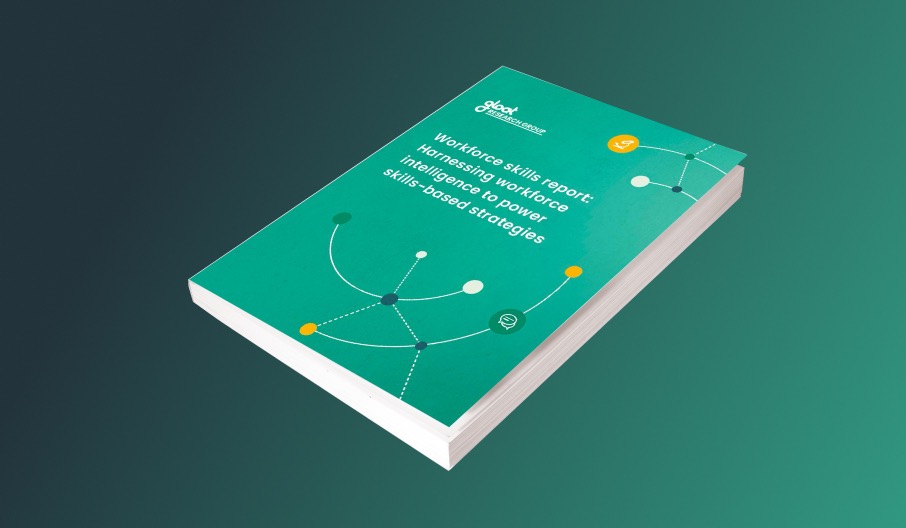9 must-have skills for HR professionals
Uncover the capabilities HR leaders need to thrive in our new working world HR professionals today are facing an entirely new imperative. The talent landscape has shifted dramatically, the pace of change is accelerating, economic and geopolitical instability is continuous, and the rapid rise of AI is shifting the skills and capabilities that employees need

Uncover the capabilities HR leaders need to thrive in our new working world
HR professionals today are facing an entirely new imperative. The talent landscape has shifted dramatically, the pace of change is accelerating, economic and geopolitical instability is continuous, and the rapid rise of AI is shifting the skills and capabilities that employees need to help their organizations drive impact.
HR teams are now trying to navigate this environment for their companies, tackling broad skills imperatives, agile transformations, and exploring a range of new technologies. But their roles are changing dramatically too. What impact do these industry shifts have on their roles and what do they as professionals need to do to prepare? To keep pace with today’s profound organizational shifts, HR leaders must build an array of new competencies that will help their companies achieve business-wide success.
9 essential skills for successful HR careers
There are many capabilities that HR leaders must hone to help their organizations overcome tomorrow’s challenges, including the following skills:
#1. Communication
Communication has always been crucial for HR—but it’s taking on an entirely different level of importance in the new world of work. HR professionals must communicate more with internal employees to drive interest and awareness in open opportunities across their organization. As remote and hybrid working becomes commonplace, HR needs to recalibrate communication strategies to ensure all employees feel connected, whether they’re sitting next to their colleagues or chatting with them from miles away.
Additionally, HR leaders will find themselves communicating more to their business partners than ever before. They’ll need to make the case for new HR technologies and show the business impact of talent shifts such as hybrid working and internal-first hiring.
#2. Coaching
In a world of talent scarcity, HR can no longer rely on external hiring to acquire the skills their organization needs. Since in-demand capabilities aren’t readily available externally, HR leaders must become skilled at coaching their people to hone these competencies. HR professionals are increasingly prioritizing internal development and launching training initiatives that go beyond compliance and basic introductions to create targeted learning experiences that align with business priorities.
#3. Emotional intelligence
As the architects of employee experience and the voice of the people they represent, emotional intelligence is essential for strong HR leadership. Now that burnout rates are reaching record levels, HR leaders must develop new strategies to promote well-being and ensure employees across their organizations feel recognized, supported, and empowered to do their best work.
HR professionals will also find themselves in the middle of some emotionally charged situations, such as disagreements between employees and their managers, communicating lay-off and restructuring decisions, and sourcing employee feedback about various initiatives.
These conversations must be handled tactfully to ensure all parties walk away feeling understood and supported. The most emotionally intelligent HR leaders can see multiple sides of a situation, empathize with everyone involved, and develop solutions that consider their people’s feelings and priorities.
#4. Conflict resolution
From the proliferation of generative AI to the shift towards skills-based operating models, employees are experiencing higher levels of workplace change than ever before. It’s up to HR leaders to help their people navigate these transitions and support their workforce as disagreements arise.
Some teams may initially be hesitant to move away from job-based models and managers may resort to hoarding their talent, so HR professionals should be prepared to play a supporting role throughout these shifts. HR must become experts at aligning employees’ needs and desires to different business goals and motivations to drive results that will keep both parties satisfied.
#5. Technological proficiency
Digital skills are becoming non-negotiable for every profession—and HR is no exception. Now that 80% of businesses are using HR software or planning to in the near future, everyone in this profession must ensure they know how to use these tools effectively.
AI-powered systems such as talent marketplaces and skills intelligence tools are quickly gaining traction because they enable HR leaders to make strategic workforce planning decisions and to ensure their workforce is developing in-demand skills. To tap into these tools, HR must develop an understanding of how these technologies work and their benefits so they can create a compelling business case for them.
#6. Data analysis skills
HR leaders use people analytics to identify high-potential employees, analyze compensation and benefits, achieve fair pay and incentives, and project future talent needs. According to the most recent People Analytics Trends Report, 85% of CHROs are making it clear that data is an essential part of their HR strategy.
HR professionals of all levels must get comfortable analyzing and interpreting data that showcases the skills their people have and the knowledge their organization should build in the future. Leaders with strong reporting skills are not only able to interpret the data; they can also turn it into compelling messages using storytelling to demonstrate business impact.
#7. Employee experience
Employees can no longer be viewed as cogs in a machine. Instead, HR teams must treat their people the way companies treat their clients. They need to deliver personalized communications at the right time that feel relevant to every employee. HR teams must devise initiatives that will delight employees and cultivate a sense of camaraderie between teammates to drive affinity, community, and engagement.
Successful HR-driven employee experience initiatives typically include creating employee surveys and acting on feedback, promoting diversity and inclusion, and launching a reward and recognition program. HR leaders must also understand that rather than focusing on perks and benefits, they must equip all employees with access to learning and development opportunities that align with their long-term career goals.
#8. Cultural awareness
Cultural awareness and sensitivity is something an entire workforce needs and it’s often up to HR leaders to help employees across the organization to build these skills. It’s particularly important when working in larger and multinational companies, because employees in one region may be accustomed to one way of getting feedback and collaborating, while their colleagues across the globe are used to something completely different. HR must be cognizant of these differences and encourage employees and managers to develop ways of communicating that respect each others’ preferences and working and communication styles.
#9. Strategic thinking
HR professionals of all levels must develop a strategic mindset. HR leaders will be expected to create data-driven strategies that make a tangible impact on key metrics and KPIs, such as reducing turnover rates or improving employee engagement.
Even before an HR professional is responsible for devising strategies, they must be able to understand the strategic intent and translate that into an execution plan. The ability to interpret and implement an HR strategy that effectively supports the overarching organizational strategy will ensure that HR leaders are driving impact within their organization and strengthen their perception as a business partner.
How to continuously develop your HR skills
While all employees should continuously broaden their skill sets, developing new capabilities will be particularly important for HR team members as their profession continues to undergo profound transformation. HR professionals of all levels should seek out cross-functional collaboration opportunities which will give them hands-on experience liaising with different teams, coaching others towards a common goal, and resolving any conflicts that arise along the way.
Talent marketplaces can help HR pursue these experiences by generating suggestions for projects, gigs, and full-time roles that align with the skills they’re looking to build. These systems can also help HR professionals find mentors in their organizations that they can work with to develop the capabilities they need to one day step into an HR leadership role.
To learn more about how HR careers are evolving and the types of capabilities leaders need to hone, check out our research report on workforce skills.





